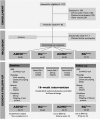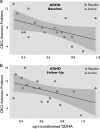Reduced Symptoms of Inattention after Dietary Omega-3 Fatty Acid Supplementation in Boys with and without Attention Deficit/Hyperactivity Disorder
- PMID: 25790022
- PMCID: PMC4538345
- DOI: 10.1038/npp.2015.73
Reduced Symptoms of Inattention after Dietary Omega-3 Fatty Acid Supplementation in Boys with and without Attention Deficit/Hyperactivity Disorder
Abstract
Attention deficit/hyperactivity disorder (ADHD) is one of the most common child psychiatric disorders, and is often treated with stimulant medication. Nonpharmacological treatments include dietary supplementation with omega-3 fatty acids, although their effectiveness remains to be shown conclusively. In this study, we investigated the effects of dietary omega-3 fatty acid supplementation on ADHD symptoms and cognitive control in young boys with and without ADHD. A total of 40 boys with ADHD, aged 8-14 years, and 39 matched, typically developing controls participated in a 16-week double-blind randomized placebo-controlled trial. Participants consumed 10 g of margarine daily, enriched with either 650 mg of eicosapentaenoic acid (EPA)/docosahexaenoic acid (DHA) each or placebo. Baseline and follow-up assessments addressed ADHD symptoms, fMRI of cognitive control, urine homovanillic acid, and cheek cell phospholipid sampling. EPA/DHA supplementation improved parent-rated attention in both children with ADHD and typically developing children. Phospholipid DHA level at follow-up was higher for children receiving EPA/DHA supplements than placebo. There was no effect of EPA/DHA supplementation on cognitive control or on fMRI measures of brain activity. This study shows that dietary supplementation with omega-3 fatty acids reduces symptoms of ADHD, both for individuals with ADHD and typically developing children. This effect does not appear to be mediated by cognitive control systems in the brain, as no effect of supplementation was found here. Nonetheless, this study offers support that omega-3 supplementation may be an effective augmentation for pharmacological treatments of ADHD (NCT01554462: The Effects of EPA/DHA Supplementation on Cognitive Control in Children with ADHD; http://clinicaltrials.gov/show/NCT01554462).
Figures



References
-
- Ahmad A, Moriguchi T, Salem N. Decrease in neuron size in docosahexaenoic acid-deficient brain. Pediatr Neurol. 2002;26:210–218. - PubMed
-
- American Psychiatric Association . Diagnostic and Statistical Manual of Mental Disorders. American Psychiatric Publishing: Washington DC; 1994.
-
- Antalis CJ, Stevens LJ, Campbell M, Pazdro R, Ericson K, Burgess JR. Omega-3 fatty acid status in attention-deficit/hyperactivity disorder. Prostaglandins Leukot Essent Fatty Acids. 2006;75:299–308. - PubMed
-
- Barragán E, Breuer D, Döpfner M.2014Efficacy and safety of omega-3/6 fatty acids, methylphenidate, and a combined treatment in children with ADHD J Atten Disord(in press). - PubMed
-
- Bauer I, Hughes M, Rowsell R, Cockerell R, Pipingas A, Crewther S, et al. Omega-3 supplementation improves cognition and modifies brain activation in young adults. Hum Psychopharmacol. 2014;29:133–144. - PubMed
Publication types
MeSH terms
Substances
Associated data
LinkOut - more resources
Full Text Sources
Other Literature Sources
Medical
Research Materials

